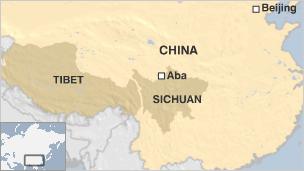Tibetan monk's self-immolation 'sparks protests'
- Published

A group campaigning for self-rule in Tibet says hundreds of people have held protests in western China after a Tibetan monk burned himself to death.
The London-based International Campaign for Tibet says the young monk set fire to himself in Aba, in Sichuan province.
China's state news agency said the monk died after protesters prevented him getting hospital treatment.
The reported unrest came three years after Tibet's most serious uprising against Chinese rule in two decades.
The BBC has not been able to independently verify these accounts, and local officials could not be reached for comment.
It is believed to be the second self-immolation since the violent demonstrations in March 2008.
Conflicting reports
The monk identified as Phuntsog, aged in his early 20s, set himself alight on Wednesday.
Tibetan rights groups reported that witnesses saw police put out the flames, then beat the monk to death, after which monks retrieved the dead body.
The account from state news agency Xinhua, however, blamed the monks for forcibly taking the monk out of hospital and hiding him in the Kirti monastery.
People in the area told news agencies of a security clampdown after the death and subsequent protests.
"The crossroads to the monastery (is) blocked by police," an employee at a hotel near the monastery in Sichuan province told AFP news agency.
"People are allowed to enter but the monks are not allowed to go out. Yesterday, the stores in this street were all closed."
In March 2008, Tibet witnessed a wave of violent anti-China protests. Beijing blamed the unrest on followers of the Dalai Lama, who it said were seeking to separate Tibet from China.
China responded to the unrest with a massive military crackdown. This extended to Aba - an area with a large ethnic Tibetan population - and violent clashes were reported.
Chinese police said they shot four protesters there in self-defence, while Tibetan activists said police had fired indiscriminately on protesters, killing at least eight.
Many Tibetans have complained about the growing domination of China's majority Han population in Tibet and accuse the government of trying to dilute their culture.
China says it has invested heavily in Tibet and has generated significant improvements in people's living standards.
- Published15 March 2011
- Published10 March 2011
- Published8 March 2011
- Published25 February 2011
- Published15 July 2010
- Published16 July 2010